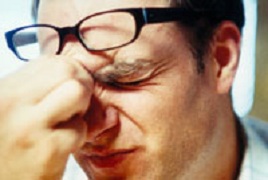What We're Reading Now
14 May 2011
Allison reviewed a classic article about the importance of sleep before teaching Choosing Balance and Leadership at Stanford University’s hospital. In "Sleep Deficit: The Performance Killer," Harvard Medical School Professor, Charles A. Czeisler, gives the shortest, most compelling argument for making sleep a priority no matter what.
Tags: allison read, balance, health care, healthcare, sleep
I fear you may have already started to tune me out once you saw the phrase, “the importance of sleep.” More and more I find people just don’t want to admit that eight or at minimum seven hours of sleep is essential. Just about everybody tries to convince me six hours is enough or, at least, they desperately want to believe it is. My colleague, PJ Rooney, Director of Training at the National Ground Intelligence Center, recently told a group of human resource colleagues, “People don’t even know they are tired because they have forgotten what rested feels like.” Or perhaps you know that you feel better with the right amount of sleep, but you’ve convinced yourself you can get away with less. This ground breaking 2006 Harvard Business Review article dispels that myth and succinctly explains the consequences and possible solutions.

In less than seven pages, Dr. Czeisler explains why we need eight hours of sleep, how a lack of sleep impacts our cognitive performance and health, and how we put ourselves and others in danger when we’re sleep deprived. You’ll learn about the downsides of our sleep stalling tactics (think caffeine and other tricks) and why organizations should care about the sleep epidemic and create policies to support a more rested workforce. Even if your company isn’t on board, there are still things you can do to take better care of your tired self. It’s full of research you can’t dispute and that will make you pause. For example:
- Coffee is the world’s second-mostly widely sold commodity after oil.
- 24 hours without sleep or a week of sleeping four or five hours a night induces an impairment equivalent to a blood alcohol level of .1%.
- Sleep restriction increases levels of appetite and stress hormones; it also reduces one’s ability to metabolize glucose and increases the production of the hormone ghrelin, which makes people crave carbohydrates and sugars.
Since this article was published, the research on sleep has sky rocketed. It’s been especially interesting to learn how a lack of sleep impacts your brain’s ability to do every single thing that is important to you in your personal and professional life (check out the NeuroLeadership Institute). Sleep even impacts your ability to be happy (check out Rachel's recent blog post to learn about our favorite book on positive psychology, The Happiness Advantage).
So my message to everyone is as follows. Quit trying to deny that sleep is important. Start by doing a sleep experiment. Commit to getting seven hours a night for three weeks and then see how you feel. My clients who have done this report that once they experience what it’s like to be rested, they find it much easier to make the choices that are required to get the sleep they need. And if you’d like to sleep better but struggle to fall and stay asleep, try these sleep hygiene tips from the American Sleep Association and talk to your doctor. I’m not saying you won’t have to give up several things to get the sleep you need, but I think you’ll find that it’s worth the sacrifice when it becomes so much easier to get what you want in every realm of your life.







Comments
Our Comment Policy:
Our blog posts are only half of the conversation. What our readers have to say is equally important to us, and we're grateful for all the comments that continue the dialog.
To ensure that the discussion here is as useful as possible to all of our readers, please be respectful of our contributors and refrain from harassing, threatening and/or vulgar language. We reserve the right to screen and remove any comments from the site. If you have a question about a comment or want to discuss our policy, please contact us. We'll talk it over.
Suzanne Henry
May 16, 2011
Right on! As a long-time, strong proponent of sleep I am so glad to see some reasoned commentary on this part of our lives. I have always wondered why sleep deprivation became a badge of honor. Thanks for posting.
Allison Linney
May 17, 2011
Maybe together we can spread the word and make being rested the real badge of honor!